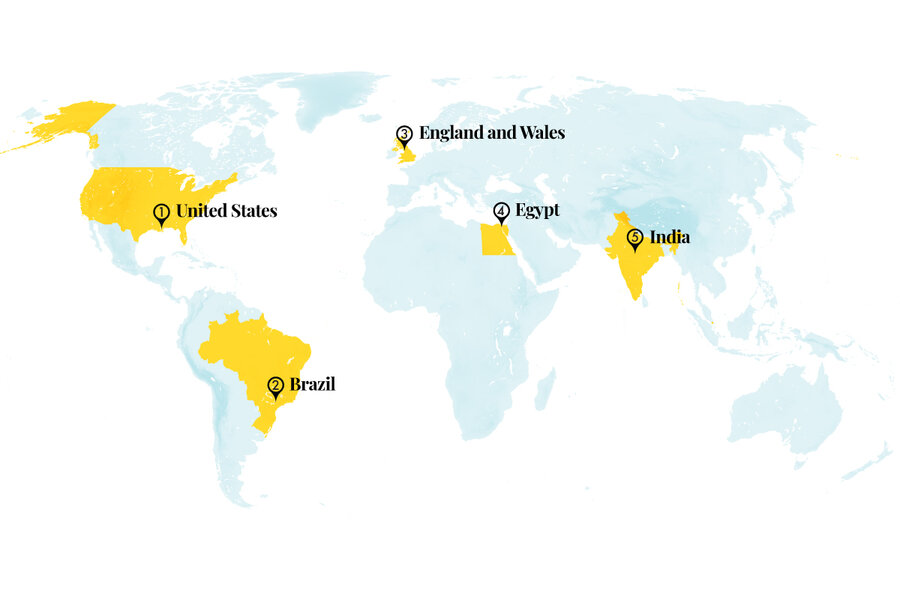Double lives: From glass back to sand, and how solar panels can save water
Loading...
1. United States
Recycled glass – turned into sand – is shoring up Louisiana marshlands. Glass Half Full Nola, a glass recycler started by two college seniors, has collected 3.2 million pounds of glass since 2020. The company supplies Tulane University researchers and its partners with a pulverized product, which in tests is nontoxic, can grow native grasses, and resists erosion.
Americans toss out 8 million tons of glass each year, less than a third of which gets recycled, according to the Environmental Protection Agency.
Why We Wrote This
A story focused onIn our progress roundup, we have students and scientists building on the status quo to discover new benefits. In New Orleans, two college friends saved glass bottles from landfill to aid coastal restoration.
Tulane’s ReCoast initiative says that without a glass manufacturer nearby, turning the recyclables into new glass would be more capital and energy intensive than making sand. Some 40 tons of recycled sand inside burlap bags have already been used for wetland restoration at the Big Branch Marsh National Wildlife Refuge on the north shore of Lake Pontchartrain. ReCoast plans to include the Lower Ninth Ward in New Orleans in future work.
Sources: Reasons to be Cheerful, Recoast, Nola
2. Brazil
Floating solar panels come with a benefit beyond renewable energy: reducing evaporation. In southern Brazil, researchers from the State University of Ponta Grossa and the University of Louisiana at Lafayette found that a 130-kilowatt floating photovoltaic system (FPS) on the Passaúna reservoir reduced evaporation by 60%.
“Freshwater scarcity is a significant concern due to climate change in some regions of Brazil; likewise, evaporation rates have increased over the years,” the researchers wrote in their paper. But by reducing the amount of surface water exposed to the sun, FPS can conserve water supply while generating energy. The one-third acre, 396-module FPS in the study covered only 0.01% of the reservoir. If it covered the entire surface, researchers estimate the amount of water saved would be equivalent to more than a year’s supply for at least 35,000 people.
Sources: PV Magazine Brazil, Energies 2022
3. England and Wales
The minimum age for marriage has been raised to 18. In an effort to combat child marriage, lawmakers for England and Wales changed previous laws that allowed teens as young as 16 to get married with parental consent. The government also closed a loophole that allowed for minors to participate in religious marriage ceremonies that weren’t legally binding.
Campaigners say that teens who marry are often coerced. In 2021, the government’s Forced Marriage Unit provided support to 118 victims of child marriage, though it said the true number of victims was likely higher. Between 2008 and 2022, courts issued 3,343 “forced marriage protection orders” related to violence, threats, or emotional abuse.
“The onus is no longer on the child to have to speak up against their parents or their community when they are faced with child marriage,” said Payzee Mahmod, a survivor of child marriage.
The practice produces worse health and well-being outcomes, which can be passed down to a family’s children, costs which also impact communities. Ending marriage among youths under 18 was included in the United Nations Sustainable Development Goals in 2015.
Sources: The Guardian, BBC, Unicef
4. Egypt
A new corridor was discovered in the Great Pyramid of Giza, using noninvasive techniques. The 30-foot corridor was discovered by the ScanPyramids project, which since 2015 has been using infrared thermography, 3D simulations, and cosmic-ray muon imaging to explore the pyramid without damaging it.
The corridor could help explain some ancient building techniques. It was likely constructed to redistribute weight, either around an existing entrance or perhaps an undiscovered chamber.
“We’re going to continue our scanning so we will see what we can do ... to figure out what we can find out beneath it, or just by the end of this corridor,” said Mostafa Waziri, head of Egypt’s Supreme Council of Antiquities.
Source: Reuters
5. India
India is elevating women’s sports with the launch of its first all-female cricket league. The Women’s Premier League’s inaugural three-week season, held in March, was composed of a five-team tournament. Despite the short season, it attracted sizable investment, with $580 million spent to acquire the five competing franchises. Broadcasting rights went for more than $117 million, and India’s Tata Group announced a five-year commitment as lead sponsor of the league. The only other women’s league in the world to attract more money is the WNBA.
“This will entirely change women’s cricket, not only in India but in world cricket,” said Harmanpreet Kaur, one of the captains who competed in the tournament.
The league “promises to give a lot of young, aspiring women’s cricketers a visible stage to showcase their skills for the world to see,” with the hope that “the WPL can do for the women’s game what the men’s [India Premier League] has been doing since 2008,” wrote The Indian Express.
Sources: Al Jazeera, Radio France Internationale, The Indian Express








